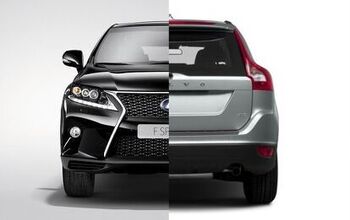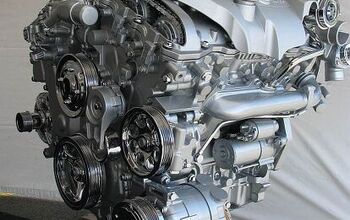Between the Lines: Wither The V8?

As we all know, those oblivious to history are bound to repeat its mistakes. Longtime readers also know I’ve gone down this road before, but the powers of my Twitter news feed shoved extra grist into this particular mill. Behold: Alain Raymond’s blog about the death of the V8 engine. Raymond’s weakest argument revolves around one fact: V8’s did lose mainstream appeal shortly after the demise of the Butterfly Collar. But Alain wishes to beat this dead horse for some misguided reason.
So here are my counterpoints. First, the V8 is crucial for the success of high profit, low volume luxury and performance machines. Second, everything a “high tech” four or six cylinder is privy to, shall work just as well in a V8. Third, if you have a mainstream family car with a V8, you’re might be a cop or a cabbie.
So let’s go Between The Lines:
When you think V8, you think American car, and when you think American Car, you generally think V8. But things are starting to change. Radically. To the point where it’s starting to look like beginning of the end for the venerable 8-cylinder V engine that, for decades, has made the American automobile famous.
Welcome to mid-1970s, Alain. Except for perhaps India and China, everyone makes a V8 engine. But let’s stick with America: outside of Corvettes, Pony Cars and Panther Chassis, nobody associates American cars with the V8. In response to consumer demand, Detroit’s made cars like the imports. But Alain wants to squelch a niche product that makes Mustangs roar and Ford’s profits soar. So let’s go there.
Some will think I’m nuts or maybe just a doomsayer, but let’s take a look at the facts. The arrival of electronics has breathed new life into the internal combustion engine. The progress made in terms of reliability, power and pollution reduction in the past 20 years has been significant.
Alain isn’t nuts, just misinformed: every improvement to the internal combustion engine has an equal benefit to all members. Electronics, advanced metallurgy and manufacturing, variable displacement engines and induction systems are no strangers to the V8 engine. What was once exclusive to the 1990 Corvette ZR-1 is now available in a 2011 Mustang 5.0, but with even more goodies (variable valve timing) this time ‘round. And many V8s are just as “dirty” as the hi-po V6s in the same market: is the Infiniti G37’s economy and carbon footprint significantly better than a Hyundai Genesis? If you have the green to buy a $40,000 luxury vehicle, the extra nickels and dimes needed to feed a V8 is far from relevant.
Take Volkswagen’s 2-litre, direct injection turbo engine, for instance: it now produces 200 hp, 100 hp per cylinder, while a few years ago we only managed to wring out 50 hp per litre.
Ricer Math: the bullshit notion that horsepower per liter means something, anything in the real world. Chassis weight, area under the torque curve, gearing (double overdrive Corvettes) and even aerodynamics screw up that argument. Let’s overlook the Ricer Math: direct injection doesn’t hate V8 engines. The DI units from Jaguar are kicking butt: the fuel/carbon specs of a 5.0L Jag XF and a 4.2L S-type are disturbingly similar. But the 5.0L has over 80 more ponies underfoot. Add a turbo (or two) to the mix, and you have the stunning performance of BMW’s latest 5 or 7-series. The Laws of Thermodynamics don’t lie, so wait until the M5 gets direct injection and a pair of turbos.
Another telling example is Ford’s EcoBoost family of engines, four-cylinder and V6 mills with direct injection, turbochargers and variable valve timing.
The four bangers have promise, as Hyundai’s latest Sonata proves: the direct injected and turbocharged I-4 could care less about the V8, its enemy are V6s found in everything from a Toyota Camry to a Nissan 370Z. Ford’s EcoBoost V6 requires all-wheel drive: making a Lincoln MKS just as terrible as a Hyundai Genesis V8, per Fueleconomy.gov ratings. And while Ford plans to put an EcoBoost V6 in something without fuel robbing AWD, an Ecoboost F-150 or Mustang is gonna be interesting from a pricing and availability standpoint: with a motor that expensive and complex, don’t hold your breath on it making waves with people who buy trucks and Pony cars for their intended duty. Who wants a $33,000-ish Mustang or $27,000-ish work truck without a V8?
In its 4-cylinder, 2-litre incarnation, the EcoBoost produces 230 hp (115 hp / L) and 240 ft-lb of torque. When you consider that the 4.6-litre V8 engine of a 2000 Mustang generated 260 hp (56.5 hp / L), it’s obvious that things have evolved quite a bit in just 10 years.
Stop the presses! Did Alain compare the Modular two-valve V8 (introduced with the 1991 Lincoln Town Car) to a modern design, using Ricer Math to tell the story? Because over time, the V8 gets better: take the new, 412hp, 5.0 Mustang with a 2-3 MPG improvement over the 2000 model. To quote Ricky Bobby, “Does that blow your mind? That just happened!”
This is a good time to mention that today’s V8s (especially those with direct injection) run with the modern four/six bangers, without the added expense, weight and durability issues of turbochargers and their associated plumbing. Not to mention without the power and economy killing disadvantages of forced induction in summertime heat soak conditions. And without the requisite upkeep (not found in owner’s manuals) that’s reduced a number of turbocharged VW/Audi products to sludged-up carcasses.
And it’s not over, as the next engine revolution will be coming from Italy in the shape of Fiat and its ingenious MultiAir system, which will be featured in the new lineup of Chrysler models. On the 1.4-litre Alfa Romeo MiTo, MultiAir enables a 170-hp output. That’s over 120 hp / L. If we extrapolate these numbers to the new 3.6-litre Pentastar V6, we get a theoretical engine output of 432 hp.
Chrysler’s ability to remain financially solvent aside, new technology is always great…until it’s not. But even if FIAT’s electro-hydraulic variable valve actuation technology works flawlessly for the next 10 years, wouldn’t a Chevy LS3 (@6.2L) make an eye-popping 753hp with such a ludicrous, baseless extrapolation? And who needs a Ferrari Enzo after that?
Will the V8 become obsolete? “Yes,” says Professor Rinaldo Rinolfi, inventor of MultiAir. “No one really needs more than 400 hp in a family car. The V8 is doomed to extinction.”
Looks like Rinaldo sold himself short: your design shall make any V8 far more desirable. Why narrow your appeal by excluding a demographic with insane amounts of disposable income? Buyers of V8 machines aren’t your average Camry/Fiat consumer. Reconsider your stance Professor, thinking of all the royalties you’ll earn on AMG’s stellar V8 portfolio! Because it’s all about the money, honey.
And if I told you that I tried the prototype of a Fiat 500 powered by a 900-cc (0.9-litre), 2-cylinder MultiAir and that it handled like a great 1.6-litre four-banger, would you believe me?
I’m speechless, trying to find the relevance of this (direct) quote in Alain’s argument. But two can play this game: what if I told you I sampled a 2004 Corvette that retails for less than a new Scion tC, has Ferrari-like handling and acceleration, 32 MPG with the air conditioning on @75mph and has 25 cubic feet of cargo in the hatch? The C5 Corvette is a fine alternative to wanna be sports cars for $18,000 or less. You know, for the performance minded individual who wants to spank every challenger they find on the road.
Back to some semblance of reality: the V8’s claim to fame is here to stay, be it in a Mustang 5.0, AMG-something, BMW-whatever, Hyundai Tau-anything or the obligatory Chevy LS-X. And as technologies like direct injection go mainstream, the V8’s dominance in the performance/luxury market will remain. And remain unquestioned. So repeat after me: long live the V8.

More by Sajeev Mehta
Latest Car Reviews
Read moreLatest Product Reviews
Read moreRecent Comments
- Corey Lewis It's not competitive against others in the class, as my review discussed. https://www.thetruthaboutcars.com/cars/chevrolet/rental-review-the-2023-chevrolet-malibu-last-domestic-midsize-standing-44502760
- Turbo Is Black Magic My wife had one of these back in 06, did a ton of work to it… supercharger, full exhaust, full suspension.. it was a blast to drive even though it was still hilariously slow. Great for drive in nights, open the hatch fold the seats flat and just relax.Also this thing is a great example of how far we have come in crash safety even since just 2005… go look at these old crash tests now and I cringe at what a modern electric tank would do to this thing.
- MaintenanceCosts Whenever the topic of the xB comes up…Me: "The style is fun. The combination of the box shape and the aggressive detailing is very JDM."Wife: "Those are ghetto."Me: "They're smaller than a Corolla outside and have the space of a RAV4 inside."Wife: "Those are ghetto."Me: "They're kind of fun to drive with a stick."Wife: "Those are ghetto."It's one of a few cars (including its fellow box, the Ford Flex) on which we will just never see eye to eye.
- Oberkanone The alternative is a more expensive SUV. Yes, it will be missed.
- Ajla I did like this one.


































Comments
Join the conversation
The amazing thing about the take rate on the LX v6's is that they offer the EXACT same epa rating as the Hemi V8: 16/25. Whats the point in not getting the bigger engine? To save a thousand bucks on a 30 grand car? Yes Chrysler's sixes are ancient and the hemi benefits from mds, but even compared to a modern v6 there just isn't much difference. Take Ford's 3.5DI, in the Edge (weighs about the same as an LX car) it makes 265hp and gets 17/24, still no advantage over a push-rod V8 that makes almost a hundred ponies more. If anything the V6 is the engine that should go. I might buy another V8 car or truck, more likely the car will be a 4cyl, but I just don't see the point of a V6 anymore.
I don't have time to read the whole article right now (I'm about to leave work for the day ;) ) All I can say is Noooooooooooooooooooooo! (we all know its coming) But I will never admit it.I grew up loving the sound of a v8 (who doesnt?) Nothing compares to that sound...not these silly 6 cylinders that sound like a diesel truck goin through the gears.sheesh. I love v8s.(especially Chevy, but at this stage, I'm not picky) and yes , it is for the sound. you can get better economy, HP,torque with other engines.... Ahhh...but the sound. Please don't go V8, PLEASE dont go. sorry for the grammar/typos/slang/whatever